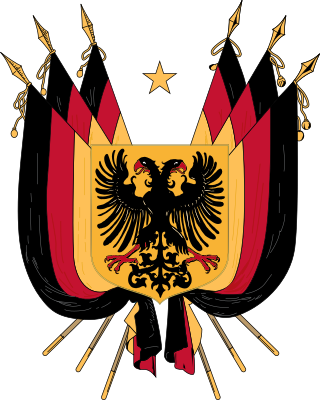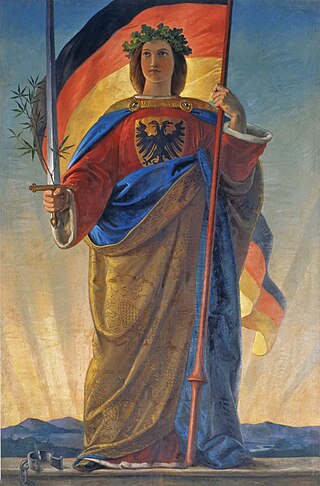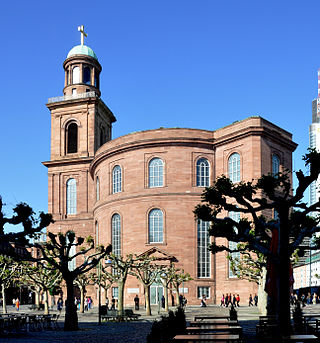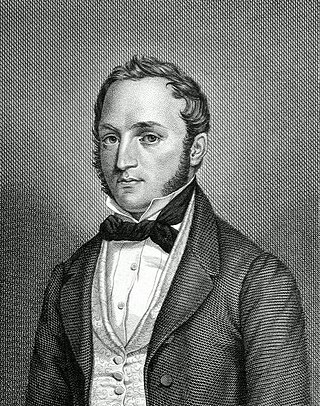Related Research Articles

Frederick William IV, the eldest son and successor of Frederick William III of Prussia, was king of Prussia from 7 June 1840 until his death on 2 January 1861. Also referred to as the "romanticist on the throne", he was deeply religious and believed that he ruled by divine right. He feared revolutions, and his ideal state was one governed by the Christian estates of the realm rather than a constitutional monarchy.

The German revolutions of 1848–1849, the opening phase of which was also called the March Revolution, were initially part of the Revolutions of 1848 that broke out in many European countries. They were a series of loosely coordinated protests and rebellions in the states of the German Confederation, including the Austrian Empire. The revolutions, which stressed pan-Germanism, demonstrated popular discontent with the traditional, largely autocratic political structure of the thirty-nine independent states of the Confederation that inherited the German territory of the former Holy Roman Empire after its dismantlement as a result of the Napoleonic Wars. This process began in the mid-1840s.

The Frankfurt Parliament was the first freely elected parliament for all German states, including the German-populated areas of the Austrian Empire, elected on 1 May 1848.
This article aims to give a historical outline of liberalism in Germany. The liberal parties dealt with in the timeline below are, largely, those which received sufficient support at one time or another to have been represented in parliament. Not all parties so included, however, necessarily labeled themselves "liberal". The sign ⇒ denotes another party in that scheme.

Germania is the name of a painting that was probably created in March 1848. It hung in the St. Paul's Church (Paulskirche) in Frankfurt, Germany. At that time, first the so-called Pre-Parliament and then the Frankfurt National Assembly, the first all-German parliament, met there. The National Assembly was a popular motif of the time, so the Germania painting also became very well-known. After the National Assembly was violently terminated in May 1849, the painting was taken down. In 1867 it was moved to the German National Museum in Nuremberg.

St Paul's Church is a former Protestant church in Frankfurt, Germany, used as a national assembly hall. Its important political symbolism dates back to 1848 when the Frankfurt Parliament convened there, the first publicly and freely-elected German legislative body.

The Casino faction was a moderate liberal faction within the Frankfurt Parliament formed on 25 June 1848. Like most of the factions in the parliament, its name was a reference to the usual meeting place of its members in Frankfurt am Main. Casino was the largest and most influential faction at Paulskirche. Its members were for the most part national liberals.

The Frankfurt Constitution or Constitution of St. Paul's Church, officially named the Constitution of the German Empire of 28 March 1849, was an unsuccessful attempt to create a unified German nation from the states of the German Confederation.

The Prussian National Assembly came into being after the revolution of 1848 and was tasked with drawing up a constitution for the Kingdom of Prussia. It first met in the building of the Sing-Akademie zu Berlin. On 5 November 1848 the Government ordered the expulsion of the Assembly to Brandenburg an der Havel and on 5 December 1848 it was dissolved by royal decree. King Frederick William IV then unilaterally imposed the 1848 Constitution of Prussia.

Friedrich Daniel Bassermann was a German liberal politician who is best known for calling for a pan-German Parliament at the Frankfurt Parliament. He emphasized the value of a national self-esteem based on progress and freedom.

The Provisorische Zentralgewalt was the provisional government of the Frankfurt Parliament (1848–49). Since this all-German national assembly had not been initiated by the German Confederation, it was lacking not only major constitutional bodies, such as a head of state and a government, but also legal legitimation. A modification of the Bundesakte, the constitution of the German Confederation, could have brought about such legitimation, but as it would have required the unanimous support of all 38 signatory states this was practically impossible. Partially for this reason, influential European powers such as France and Russia declined to recognize the Parliament. The delegates on the left wanted to solve this situation by creating a revolutionary parliamentary government, but, on 24 June 1848, the majority voted for a compromise, the so-called Provisional Central Power.

The German Empire was a proto-state which attempted, but ultimately failed, to unify the German states within the German Confederation to create a German nation-state. It was created in the spring of 1848 during the German revolutions by the Frankfurt National Assembly. The parliament elected Archduke John of Austria as its provisional head of state with the title 'Imperial Regent'. On 28 March 1849, its constitution was implemented and the parliament elected the king of Prussia, Frederick William IV, to be the constitutional monarch of the empire with the title 'Emperor of the Germans'. However, he turned the position down. The empire came to an end in December 1849 when the Central German Government was replaced by a Federal Central Commission.
The Baden Revolution of 1848/1849 was a regional uprising in the Grand Duchy of Baden which was part of the revolutionary unrest that gripped almost all of Central Europe at that time.

The factions in the Frankfurt Assembly were groups that developed among delegates to the Frankfurt Parliament that met from 18 May 1848 to 31 May 1849 in the Paulskirche in Frankfurt am Main. They coalesced as groups of like-minded representatives started meeting, and were named after the various hostelries at which they met.

Victor Franz Freiherr von Andrian-Werburg was a liberal Austrian politician, most notably as a member of the Frankfurt Parliament.

Franz Duncker was a German publisher, left-liberal politician and social reformer.

Carl Adolf Cornelius was a German historian. In the context of the 1848 revolutions he was elected to the Frankfurt Parliament in 1848/49, after which he switched from the schools sector to the universities sector and built a reputation as a church historian.
Events from the year 1848 in Germany.
Herbert Arthur Strauss was a German-born American historian.
Hugo Wesendonck was a German entrepreneur, lawyer and politician.
References
- ↑ Siemann, Wolfram (15 October 1998). The German Revolution of 1848-49. Palgrave Macmillan. pp. 188–200. ISBN 9780312216955.
- ↑ Günter Wollstein (21 January 2010). "Vorparlament und Paulskirche | bpb" (in German). Archived from the original on 2018-12-20. Retrieved 2018-12-20.
- ↑ Robert von Mohl, Lebenserinnerungen, Volume 2, Stuttgart/Leipzig: Deutsche Verlags-Anstalt, 1902, OCLC 310725166 (in German), p. 66.
- 1 2 Martin Kitchen, A History of Modern Germany: 1800 to the Present, 2nd ed. Chichester, West Sussex/Malden, Massachusetts: Wiley-Blackwell, 2012, ISBN 978-0-470-65581-8.
- ↑ Frank Eyck, The Frankfurt Parliament 1848–1849, London: Macmillan/New York: St. Martin's, 1968, OCLC 438285, pp. 223, 296.
- ↑ Barbara Vogel, "Beamtenkonservatismus. Sozial- und verfassungsgeschichtliche Voraussetzungen der Parteien in Preußen im frühen 19. Jahrhundert," in Deutscher Konservatismus im 19. und 20. Jahrhundert: Festschrift für Fritz Fischer zum 75. Geburtstag und zum 50. Doktorjubiläum, ed. Dirk Stegmann, Bernd-Jürgen Wendt, and Peter-Christian Witt, Bonn: Neue Gesellschaft, 1983, ISBN 978-3-87831-369-4, pp. 1–32, p. 30 (in German)
- ↑ Frank Engehausen, Die Revolution von 1848/49, Seminarbuch Geschichte, Paderborn: Schöningh, 2007, ISBN 978-3-8252-2893-4, p. 129 (in German)
- ↑ Engehausen, p. 86.
- ↑ Ulrike Ruttmann, Wunschbild - Schreckbild - Trugbild: Rezeption und Instrumentalisierung Frankreichs in der Deutschen Revolution von 1848/49, Frankfurter historische Abhandlungen 42, Stuttgart: Steiner, 2001, ISBN 978-3-515-07886-3, p. 31 (in German)
- ↑ Engehausen, p. 189 (in German)
- ↑ Die Deutschen und die Revolution: 17 Vorträge, ed. Michael Salewski, Ranke-Gesellschaft, Göttingen: Muster-Schmidt, 1984, ISBN 978-3-7881-1738-2, p. 216 Archived 2014-07-02 at the Wayback Machine (in German)
- ↑ Johann W. J. Braun, Deutschland und die deutsche Nationalversammlung, Aachen, 1849, OCLC 43930777, p. 49 (in German)
- ↑ Dieter Hein, Die Revolution von 1848/49, Munich: Beck, 1998, ISBN 978-3-406-43219-4, p. 134 (in German)
- ↑ Peter Behrendt, "Jugendliche als Gefahr oder Triebkraft des Politischen? Zum Streit um den politischen Status von Jugend in der Frankfurter und Weimarer Nationalversammlung," in Inklusion und Partizipation: politische Kommunikation im historischen Wandel, ed. Christoph Gusy and Heinz-Gerhard Haupt, Historische Politikforschung 2, Frankfurt: Campus, 2005, ISBN 978-3-593-37737-7, pp. 79–104, p. 83, note 14 (in German)
- ↑ Eyck, p. 296.
- ↑ History of the German People from the First Authentic Annals to the Present Time volume 13 Modern Germany: Struggle for reform and unity, 1848–1870, ed. Charles F. Horne and Augustus R. Keller, New York: International Historical Society, 1916, OCLC 32908069, p. 68.
- ↑ Christian Friedrich Wurm, Die Diplomatie, das Parlament und der deutsche Bundesstaat 1. December 1848–März 1849 volume 1, Braunschweig: Vieweg, 1849, OCLC 236388385, p. 25 (in German)
- ↑ Helmut Kramer, Fraktionsbindungen in den deutschen Volksvertretungen 1819–1849, Schriften zur Verfassungsgeschichte 7, Berlin: Duncker und Humblot, 1968, OCLC 604275984, p. 139 (in German)
- ↑ Die Württemberger und die deutsche Nationalversammlung 1848/49, Beiträge zur Geschichte des Parlamentarismus und der politischen Parteien 57, Düsseldorf: Droste, 1975, ISBN 978-3-7700-5085-7, p. 248 (in German)